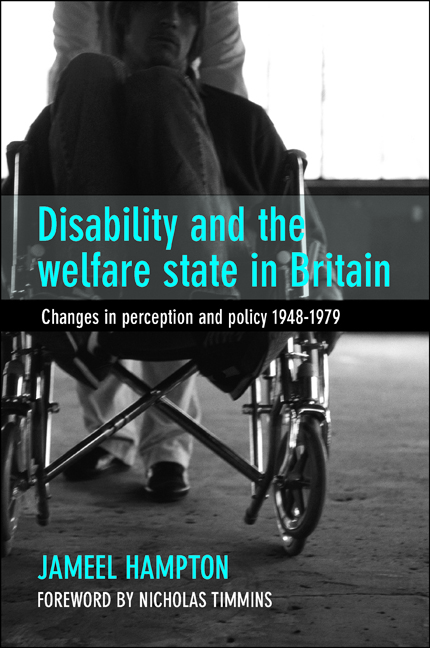Book contents
- Frontmatter
- Contents
- List of tables
- List of acronyms
- About the author
- Acknowledgements
- one Introduction
- two The old regime: provision for disabled people before the welfare state
- three Promotional welfare, 1948–63
- four The emergence of disabled people, 1964–69
- five Cinderella of the welfare state: legislation for disabled people, 1970–72
- six The final days: disability at the end of the welfare state, 1973–79
- seven The last waltz: epilogue
- eight Conclusions
- Appendix: Ministerial periods of office
- Bibliography
- Index
three - Promotional welfare, 1948–63
Published online by Cambridge University Press: 01 September 2022
- Frontmatter
- Contents
- List of tables
- List of acronyms
- About the author
- Acknowledgements
- one Introduction
- two The old regime: provision for disabled people before the welfare state
- three Promotional welfare, 1948–63
- four The emergence of disabled people, 1964–69
- five Cinderella of the welfare state: legislation for disabled people, 1970–72
- six The final days: disability at the end of the welfare state, 1973–79
- seven The last waltz: epilogue
- eight Conclusions
- Appendix: Ministerial periods of office
- Bibliography
- Index
Summary
Timeline: developments in statutory welfare for disabled people, 1948–63
1946 The work participation emphasis of the National Insurance Act and the Industrial Injuries Act excludes most disabled people.
1948 The National Assistance Act replaces the Blind Persons Act 1920. Statutory welfare for disabled people and blind and deaf people is made the responsibility of local authorities under the direction of the Ministry of Health.
The Children Act creates a special place for child services compared to other PSS groups.
1951 Ministry of Health Circular 32/51 outlines the range of services local authorities may offer disabled people.
1952 Ian Macleod becomes Minister of Health.
1956 The Piercy Committee calls for increased funding for local services for disabled people.
1957 The Boucher report recommends greater local efforts in providing residential care, home visits and coordination of all local domiciliary services.
1959 The Mental Health Act accelerates the move toward noninstitutional statutory services.
The Younghusband report advocates community-based social work.
1960 Local authority services schemes for disabled people are made mandatory by the Ministry of Health.
1962 Peter Townsend's The last refuge describes the abject lives of disabled and elderly people in statutory residential homes.
1963–64 The Douglas-Home government considers selective cash benefits for the general classes in advance of a general election.
Introduction
For many, the great optimism about the 1943–48 welfare state settlement seemed to promise the end of the exclusion of disadvantaged groups. Notwithstanding such great expectations, did a familiar reality remain in the subsequent 15 years? For disabled people, was it the old regime in the New Jerusalem?
Overshadowed by both the creation of the welfare state and the enthusiasm for change in the mid and late 1960s, it has been assumed that there was little development in statutory welfare for disabled people in this period. There has also been little investigation of the idea that the state, the House of Commons, the media or the Conservative governments did not ‘discover’ disabled people until the mid-1960s. This was a period of ‘promotional welfare’ – statutory services for disabled people were to promote a disabled person's ability to participate more fully in all aspects of life and support, not supplant non-statutory efforts. From the Blind Persons Act 1920, promotional welfare was to alleviate destitution with employment training, braille lessons, home visits, and if necessary, residential accommodation.
- Type
- Chapter
- Information
- Disability and the Welfare State in BritainChanges in Perception and Policy 1948-79, pp. 49 - 82Publisher: Bristol University PressPrint publication year: 2016



